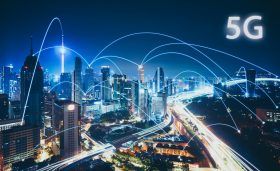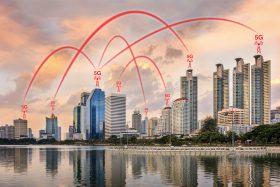Verizon, Samsung Zero In on 5G Fixed Wireless

Verizon and Samsung yesterday announced that the carrier plans to deliver its first commercial 5G services in the second half of this year in Sacramento, Calif. using a fixed wireless networking technology from Samsung Electronics America.
Verizon’s initial focus will be on making available 5G wireless services that will provide an over-the-air alternative to cable and fiber optic technologies that require physical connections to be made to either a home or an office. One of the reasons Verizon is selecting a city in California to roll out this service first is that the carrier markets its Fios fiber optic networking services on homes and offices mainly in the east, says Alok Shah, vice president for networks strategy, business development and marketing for Samsung Electronics America.
In addition to working with Verizon, Shah notes that Samsung is also working with AT&T on making available both fixed and mobile 5G services in Indianapolis. Samsung has been able to win that business because it provides carriers with an end-to-end approach to 5G networking services spanning everything from home routers and mobile devices to base stations and radio access units, says Shah.
Verizon has also pledged to expand the range of mobile 5G services it will offer based on Samsung networking technologies in 2019. Those devices and systems also incorporate the first commercial ASIC-based 5G modems and mmWave RFICs developed by Samsung.
Add on top of that local business and institutions and it becomes clear that 5G wireless networks will rapidly proliferate. Most of those services will be offered at premium over existing services. But Shah says 5G wireless networking is expected to be particularly attractive in locations where tearing up streets and parking lots to install, for example, fiber optic cables is prohibitively expensive. Fixed wireless networks take advantage of fiber that in most cases has already been installed as far as a local utility pole.
Shah says now that first 5G technical standards have been formally released by the 3GPP wireless standards body there will be many more commercial deployments by various carriers in 2018. But the bulk of most commercial 5G networking services will not come online until 2019.
"The size of the market for 5G wireless is over 30 million households," says Shah.
In the meantime, Shah says there will be significant 5G technology demonstrations at the Olympic games to demonstrate new use cases enabled by 5G networking services.
While it’s clear that 5G networking services that will enable everything from virtual reality applications to more advanced Internet of Things (IoT) deployments will soon become a reality, it still may be a year or more before most end users and organizations experience the benefit --unless, of course, they are willing to move to a specific location in 2018 to access it.

















